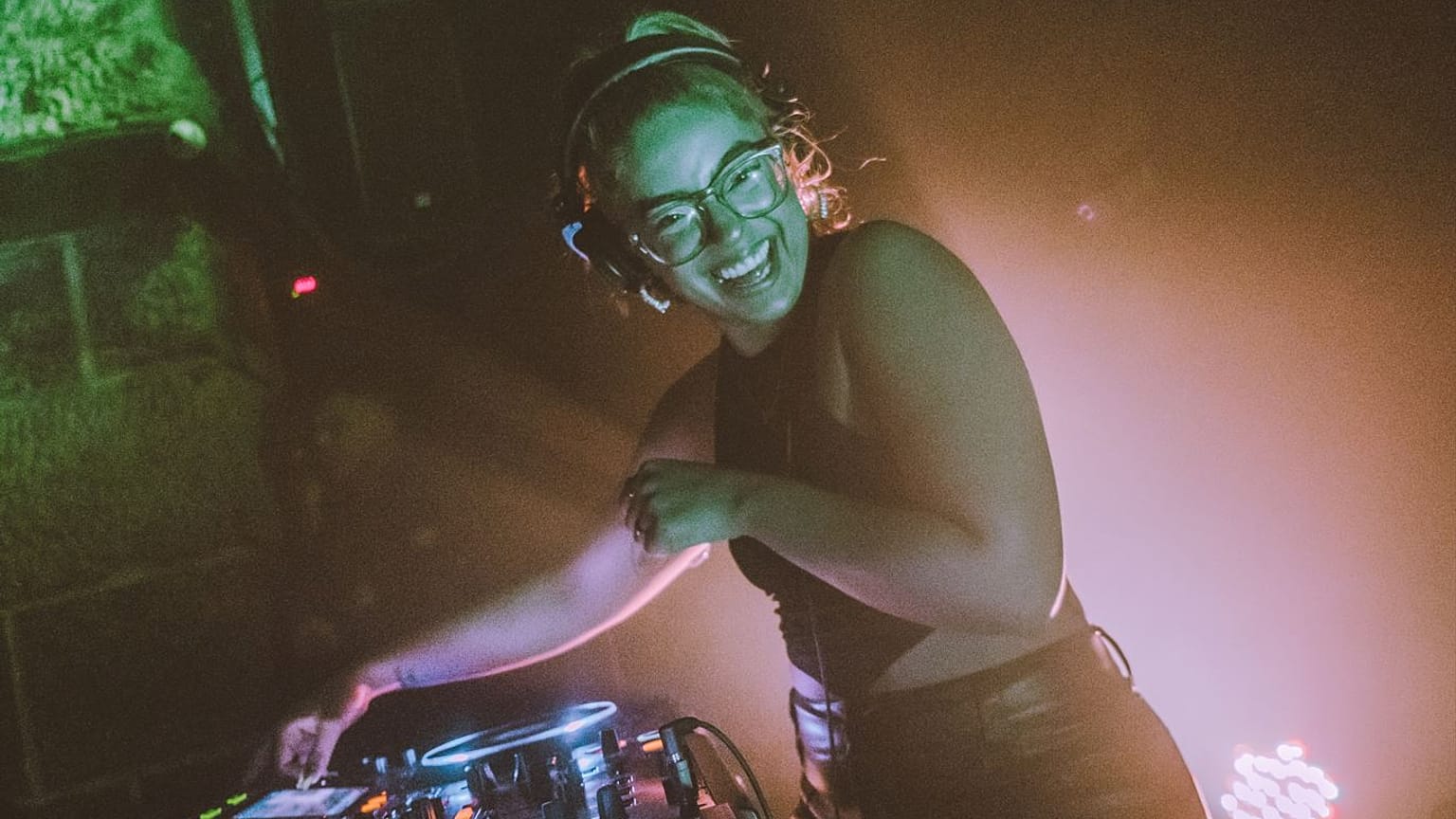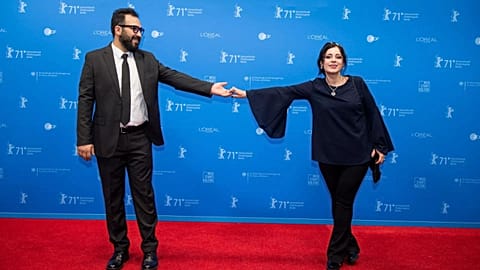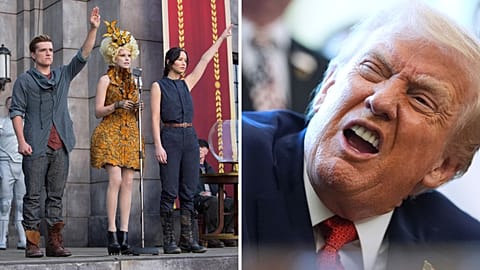International DJ Jyoty talks about the importance of playing politics after joining over 1,000 artists protesting against Germany's recently abandoned controversial “anti-discrimination clause” for arts funding.
One of the most exciting names to emerge from the British music scene in years, Jyoty has built a name for herself with her highly regarded radio shows.
Her music spans all genres, from UK Garage, to house afro to unreleased classics and more underground electronic music.
If you've not yet heard or seen her before then do check out her intensely impressive performances on BBC Essential Mix and the Boiler Room which went viral, racking up an impressive 3.6 million views on YouTube.
Originally set to play her debut at the notorious Berghain club this Friday, the artist joined a slew of other internationally recognised names in cancelling appearances in the German capital, a move which resulted in the Berlin Senate dropping the controversial “anti-discrimination clause” for arts funding.
Over 1,000 names across cultural sectors, such as film, publishing and music, stood up in solidarity with Palestine, as the backlash mounted. Winners of both the Turner and Nobel Prizes, including Lawrence Abu Hamdan, Charlotte Prodger and Annie Ernaux, are amongst those who joined the Strike Germany movement.
The clause, which was announced last month, specified that to receive government arts funding, recipients needed to reject antisemitism as defined by the International Holocaust Remembrance Alliance’s (IHRA). Their definition of antisemitism includes comparing Israeli policy to Nazis and denying the State of Israel the right to exist.
This is not just Jyoty's first political action. She also stood up in solidarity with Indian farmers who went on strike a few year backs. Jyoty isn’t just a broadcaster and a DJ, she also worked for the UK Labour party after studying politics.
Euronews Culture caught up with her to find out exactly why she withdrew from Berlin’s dance music CTM festival, which has been running for 25 years.
Talk us through your motivation for deciding to boycott the CTM Festival in Berlin and why you won’t be playing?
Actually, that question needs to be rephrased because I didn't boycott CTM Festival. And I'm also not boycotting Berlin. I'm boycotting Germany. I know the booker of CTM for over 10 years, and I know the amazing work that they've done over the years. The reason why I've decided to join Boycott Germany is because I've always said that I don't play for governments, I play for people. So, for me, I go into countries that I think have disgusting leadership. But that's because when we come together in the club, we try to escape that and we bring like-minded people together.
But also because the world of art often can provide a counter perspective and a counter voice of those in power. So the reason why for the first time, I've gone against my own rules and am boycotting a country from, you know, bringing my work and my talent there. That sounds weird, but I don't know how else to say it. Now the cultural sector and the art sector are being dragged into policing people, policing artists and policing artists’ beliefs and their speech and their freedom of speech. And that's where we have to draw a line. And that's why I ended up pulling out of, unfortunately, CTM Festival. But, you know, it's another venue that does receive government funding or I think the festival does, and I just don't think it's smart for me to then go there and in a way co-sign this way of governing because I think these two should stay separated.
What was the turning point? When did decide to cancel your appearance?
I think it became really clear for me when they made a public statement that the platforms and venues that receive funding from the government should be in line with helping them enforce what they believe is anti-Semitism, which in their case, actually, consists of being pro-freedom for Palestinians. And I think that's like a very concise way of putting it. And when you're saying, hey, we'll only give you money if you make sure that people that perform in your space think like us and don't broadcast any messages that go against our messaging and our definition, then I think it becomes a very slippery slope.
It's also just unsafe because my sets are known to always have some sort of part in it that reflects current world affairs. And so my sets lately have had a lot of Palestinian freedom songs in it. I don't want to get dragged out of the club afterwards because it may be considered anti-Semitic, which it isn't. And I think by just pulling out, I'm just saying, I don't agree with this on a larger scale, because if it happens today and during this conflict, then moving forward it might be something else.
So what are you hoping you’ll achieve by pulling out?
Michail, who is one of the founders and head bookers of CTM Festival, tweeted that he had just come out of a meeting with [cultural senators] from Berlin. They've overturned the clause for venues and the cultural funding because of the how much attention the strike got. He also said, ‘well done to everyone' pulling out.
We'd been looking forward to it for a very long time. And I think, you know, it was going to be a back to back with my good friend Skrillex. So we were looking forward to that. But, you know, I mean, I just I said to my team, my agent and my manager, I said, I am so lucky I get to travel the entire world.
If we don't make some sort of noise, we're actually saying that we're OK with it. And I got really positive responses. People from Berlin wanted to come and see me. Everyone look at my inbox flooded so sad. I'm going to miss you. So I was like so supportive of this. We were like, We're with you.
How did people react to you pulling out?
When Manuka Honey and I first pulled out, CTM did a post on their public channel saying, ‘we support these artists and we don't agree with this decision within lawmaking’ and they also first had an open comment section. But when they noticed that from within Germany, the comments section started turning a little bit negative. Manuka Honey and I were called Hamas supporters and terrorist supporters, and they closed the comment section.
CTM would never use this [cancellation] against me, and if they wanted to book me again in the future, they will. But let's say Berghain, which is obviously a separate entity, I could, for some reason, now be their bad books. But I will live another day and I will sleep peacefully because what is being on the blacklist of one club in comparison to not knowing if you're going to be bombed, you know? Nothing. My manager has been a little bit nervous, but I don't know how much more careful I can be than saying this goes against artistic freedom. There's a difference in how different promoters are handling the situation. I think they've just dealt with it well.
Do artists have a responsibility to speak out?
Here's the thing. I think I've always said this over the years because as I'm now getting like a bigger platform, I think a lot of people maybe now for the first time are seeing that I'm vocal about something, when actually in reality, I've been so vocal over the years. Whether it's the British government, whether it was the farmers protests in India, I'm so vocal about how I feel about Modi. I speak a lot about the state, but I also come from a political background and which a lot of people seem to overlook, no matter how often it gets discussed in interviews and other press moments.
So this is genuinely a hobby, almost, of mine. I have a natural interest in world politics, and when I speak about it, I don't speak about it as the artist Jyoty. I just speak about it as a human. One thing I think we really need to understand is that even though I completely understand and validate the sentiment that someone might have, that when people with a platform or a public platform within the world of art or sports or whatever that might speak up on injustice, we need to always remind ourselves, why did we make these people famous in the first place? Was it because you liked them as a footballer? Was it because you liked their music and now you expect something from them that they never entered this world in to begin with? And we need to also ask ourselves why we look to artists and footballers and actors as political, moral compasses.
So what can people do to make a difference?
We're living in the age of social media, so if you want to support a good cause right now, be it for the Palestinians or the people in Congo or Sudan moving forward. It could be someone else if you do want to. I think as nasty as online world can be, this is also where you find your support groups and your world and there's so many ways of supporting you know, there's literally having uncomfortable conversations, questioning people going into the workplace and just asking, 'oh but why? Can you explain why we have this way of thinking within the workplace or why we have this policy or why we can't do this anymore or we can't wear this anymore?' I like having uncomfortable conversations and having uncomfortable moments, whether you're a student or whether you work in nine to five or whether you're on stage with a microphone in your hand.
The way to show support is engaging in conversation. And even if that means, ‘hey, I don't actually understand much, but I'm willing to learn.’ I think where we're at now is like we have this insane divide between people being extremely vocal, which is always great, and then we've got people completely steering away from it. But why can't we find a middle ground? An increase in support is just people talking about it. I think also people fail to understand that all these constant decisions being made or being brought up on a global level is because everyone's talking about it so if we continue to do, some sort of change is bound to happen.


















